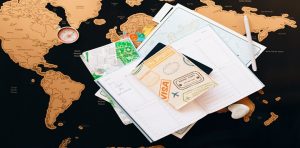Travel scams and how to aviod them
Travelling is supposed to be fun. You travel to see the world, see the beauty of the world, relish every scenery and return with a bagful of good memories and some souvenirs as well. But not everyone returns with sweet memories and forget souvenirs, some of us return without our personal bags. Whenever you travel, whether abroad or in your own country, you are vulnerable to falling victim to a travel scam. And this isn’t a new story but it has been happening since the times of Marco Polo. Travel scams can affect anyone, knowing what to look for might help you avoid getting ripped off.
Here are some of the most popular travel scams, and how you can defend yourself from them.
Travel Scams: Bogus Travel Agents
Whenever you are travelling or decide to travel, you should not trust a tour operator or the travel agent. Especially if you don’t know them like their office address etc. Never give a payment to travel agents if you can’t track them easily through publicly available records. We are in a Digital era and so are these travel agents, so a lot of people create fake& bogus versions of websites and dupe innocent travellers. When you are searching for a hotel to stay or a tour operator who can arrange your holiday for you, always ensure you go to a reputed website.
And if there is a deal online, that seems to be too good to be true, chances are it is. Scamsters create a copy-cat version of websites and run ads or pay a lot of money to appear at the top of a search on Google or Bing. You either end up paying too much for your hotel reservation or you get robbed of your money.
How to Avoid this Travel Scam
Keep a close eye on the website’s address/URL. There will be a mistake like a spelling error or characters or symbols used instead of the alphabets. And if you’re unsure whether it is right, just search again to find the homepage of the company you were looking for. You should also never pay for a service via wire transfer or any other irreversible money-transfer system.
Travel Scams: Short-Changing Currency
Probably one of the oldest travel scams of the travelling world. Scamsters rely on your lack of knowledge of the local currency/foreign currency to dupe you. They will either give you wrong change or counterfeit notes or mix smaller notes with bigger notes so that the pile looks bigger etc.
How to Avoid this travel scam
Research beforehand about the currency of the country you’re planning to visit. Try to remember what the notes look like. Always ensure you carry less amount of foreign currency with you. The best way to safeguard yourself from this travel scam is to take your currency in a Forex Card. If you need cash, you can withdraw it from an ATM. BookMyForex Forex Cards come with free withdrawals*. And these cards work worldwide.
Thailand Scams: Tips For Avoiding Tourists Traps When in Thailand
Travel Scams: Fake Event Tickets
There is always this desire to attend concerts or visit historical places like museums, castles etc when you are abroad. Most of these places require a paid entry ticket. And we live in an age where people use high-tech forging to create fake IDs, currencies, or even event tickets and make them look authentic. If someone tries to sell you a high-price ticket or even a cheap ticket to an event they claim is sold out, don’t buy it. You will be turned away at the gate. Buy directly through the official website or from shops that have official tourist licenses.
How to Avoid this Travel Scam:
Always buy your concert or even tickets from authorized sources like a verified online reseller or the box office.
Travel Scams: Fake Guides
Your life is not like Jab Harry Met Sejal and you won’t get a Shah Rukh Khan as a tour guide. But seriously, if someone approaches you near a tourist area and offers to be your guide, just say No. Some people try this at naive tourists just to earn few extra bucks and they will have no useful knowledge of the city or the place you are in. And some of them are actually criminals whose intentions are to rob you. Or in places like Thailand, they may coax you into a nearby store to get what they claim the “best offers” on local antiques or souvenirs. It is all an elaborate plan to extort money from you.
How to avoid this Travel Scam:
Visit the local travel agency or the official website of the tourism department of the country you are in and pre-arrange a guide. You can also compare the charges of the guides and know more about your guide. through an official tourism office or a local travel agency so you can compare prices and know what you’re getting.
Travel Scams: Credit Card Fraud
Credit Card frauds are increasing every year and most vulnerable seem to be foreign tourists. For example, as soon as you check into your hotel, you may get a call from someone who claims to be working at the front desk of the hotel. They will claim that they need to “verify” the details of your credit or debit card. This is all an elaborate scam and these people have no connections to the hotel. And all they care about is your data-Credit card data.
How to Avoid this Travel Scam:
Always be suspicious of anyone who calls you asking for your credit or debit card information, no matter what. Always stay close to your card. Don’t give your card details over the phone or internet. Go to the reception and pay them yourself.





























Leave a Reply